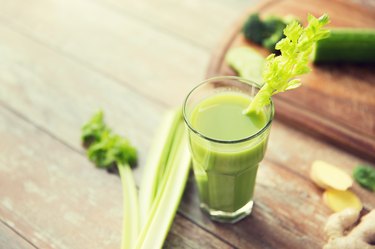
You've seen those trendy green bottles sitting pretty on grocery store and juice bar shelves, tempted to give the hyped-up juice a try. After all, you really can't go wrong by adding celery to your diet. But when it comes to the green veggie's juice, all of its lofty health claims may be overblown.
It's true that celery juice contains plenty of nutrients and antioxidants, but don't count on it to "detox" your body. "Our body is naturally designed to manage its own detoxing," explains Rachel Fine, RD of To The Pointe Nutrition. "From the liver and skin to our intestines, we are metabolically wired to naturally excrete waste that builds from both natural metabolism and from the environment."
Video of the Day
Video of the Day
If you're considering adding celery juice to your daily meal plan, dig a little deeper to figure out if it's a good idea — you might be better off simply eating more raw celery, along with other nutritious fruits and vegetables.
1. Celery Juice Packs Many Nutrients
It's difficult to eat a whole bunch of celery at once, but it is possible to drink the juice of that bunch. When you juice the celery, it concentrates the vitamins and minerals into an easily drinkable beverage. The nutrients in celery juice include:
- Potassium: Potassium is an electrolyte and an essential mineral that helps your body maintain healthy blood pressure levels and helps your muscles contract, according to the Academy of Nutrition and Dietetics. It also aids with the breakdown of carbohydrates, and it is essential for building muscle and proteins. A cup of raw celery juice contains 670 milligrams of potassium, according to the USDA, which is 19 to 25 percent of the recommended dietary allowance (RDA) for men and women, respectively.
- Calcium: An essential mineral, calcium builds and maintains strong, healthy bones and teeth, and it's vital for maintaining a strong skeletal structure, per the International Osteoporosis Foundation. Calcium also helps transmit information through your nervous system, and it aids in the dilation and constriction of blood vessels. The RDA for adult men and women up to age 70 is 1,000 milligrams of calcium a day. A cup of celery juice contains 99 milligrams, or 10 percent of the RDA.
- Vitamin K: Vitamin K supports blood coagulation, making it essential for the healing of wounds and bruises, per Mount Sinai. Vitamin K also helps your body use calcium, making it important for maintaining healthy bones and teeth. A one-cup serving of raw celery juice contains about 100 percent of your RDA of vitamin K.
- Folate: Folate, one of the B vitamins, helps your body break down, produce and use proteins. The RDA for folate for adults is 400 micrograms, according to the National Institutes of Health. Each cup of celery juice contains nearly 78 micrograms of folate, or 2 percent of your RDA.
2. It Contains Antioxidants
Celery has a significant amount of antioxidants, compounds that limit the damage caused by free radicals.
Free radicals are both natural and man-made, according to the American Academy of Family Physicians, and can include chemicals that your body creates when turning food into energy; toxins such as tobacco, alcohol and pollution; the ultraviolet rays from the sun or tanning beds; and substances contained in processed food.
A review of nine studies published in July 2017 found that celery has a number of antioxidant compounds, which include caffeic acid, ferulic acid, tannin, luteolin and saponin, per research in the Journal of Evidence-Based Integrative Medicine.
One Major Drawback: Celery Juice Lacks Fiber
When you juice any fruit or vegetable, including celery, you lose the fiber content. "We're letting the juicer 'pre-digest' the fibrous components of the stalk," Fine says. "While juice provides a good source of vitamins, minerals and other protective compounds, you won't benefit from its fiber."
The fiber in celery is the insoluble variety, which helps move material through your digestive system and increases the bulk of your stools, which helps if you have problems with constipation, according to the Mayo Clinic. Eating plenty of fiber has other benefits, too, including decreasing the risk of hemorrhoids and diverticular disease, lowering cholesterol levels, controlling blood sugar and helping with weight management.
The Bottom Line
Celery juice may not be worth the hefty price tag when you buy it at the store or the effort involved with making it at home. You can get all the benefits the juice provides — plus the fiber — by eating celery instead of juicing it. Try chopping it and tossing into salads, sautéing it with other veggies in a stir-fry and serving it alongside hummus for a healthy snack.
- Cleveland Clinic: Celery Juice Is a Trendy Detox Drink, But Does it Actually Have Benefits?
- Mayo Clinic: "Dietary Fiber: Essential for a Healthy Diet"
- Journal of Evidence-Based Integrative Medicine: "A Review of the Antioxidant Activity of Celery"
- Academy of Nutrition and Dietetics: "What Is Potassium?"
- USDA: "Celery Juice"
- International Osteoporosis Foundation: "Calcium"
- Mount Sinai: "Vitamin K"
- National Institutes of Health: "Folate"
- American Academy of Family Physicians: "Antioxidants: What You Need to Know"